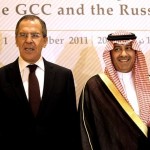 The Saudi Arabian Ministry of Foreign Affairs shot back on Sunday at their Russian counterparts for making statements over events in the simmering Qatif region.
The Saudi Arabian Ministry of Foreign Affairs shot back on Sunday at their Russian counterparts for making statements over events in the simmering Qatif region.
After prominent dissident Shia cleric Sheik Nimr Al-Nimr was arrested and shot last week, several protesters took to the streets in Qatif only to be fired upon by police, killing two protesters in the process.
While there have been conflicting reports of how the protesters were killed, the Russian statement called it “clashes between law enforcement and a group of peaceful demonstrators.”
In a statement on Thursday, Russian Representative on Human Rights for the Ministry of Foreign Affairs, K. K. Dogolov, said, “the development of the situation in the Eastern province of Saudi Arabia in recent days causes great concerns.”
The representative went on to state, “From our point of view, there is a risk that these events will make a negative influence on the stability and consent of civil society in Saudi Arabia.”
From the Saudi perspective, Russia overstepped. A Ministry of Foreign Affairs official told Saudi Press Agency that Dogolov’s comments were “a blatant interference, unjustified in any case, in the Kingdom’s affairs and simultaneously contrary to political and diplomatic principles and rules.” The rebuttal cited Saudi efforts to respect the sovereignty of other powers and suggested Russia do the same.
Gamal Eid, an Egyptian lawyer and human rights activist, said this is typical of major powers such as Russia, China, and the United States. “The major countries are always commenting on the events inside other countries; even though Russia has been accused of suppression of protest inside Russia.”
The statement ends by drawing attention to a crisis Russia has found itself in the middle of, “The Kingdom hopes that the issuance of such a strange statement does not aim to distract attention from the brutal and heinous massacres committed by the Syrian regime against its people.”
Indeed, Saudi Arabia and Russia have found themselves supporting opposite sides in the Syrian conflict. Saudi Arabia offers outspoken support for the rebels, while Russia continues to back their ally Bashar Al-Assad. AP reports site Damascus blaming Saudi Arabia and Qatar for supplying the rebels with funding.
Russia, on the other hand, consistently stands in the way of Security Council action on Syria, who is an arms purchaser, though those contracts are currently halted.
Dr. Marat Terterov of the European Geopolitical Forum says there may be reality to the Saudi accusation and may hint at more going on than meets the eye. He admits that while there is little known about what the inner workings of Russian diplomacy what is common is for these types of comments from them “to be a public level PR response that is tied to some other closed door negotiations.
The Saudis are trying to foster regime change in Damascus and the Russians are proving to be a stumbling block. If the Russians are starting to believe that Syria is a slowly sinking ship, perhaps they are engaging in tough negotiations over Al-Assad.”
If behind-the-scenes negotiations are not going well, Russia may be resorting to public condemnations, such as the recent one in regards to Qatif, as a way of pushing back Saudi meddling in Syria. Meanwhile, violence continues in Qatif. The AP reported that over the weekend two attacks on police stations left one attacker dead and six policemen injured.

